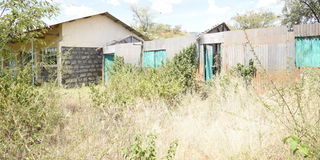Learning paralyzed as four schools are shut down in Kerio Valley

A section of Kapindasum Primary School in the porous Baringo South overgrown with shrubs. It is among schools in the constituency that is yet to reopen due to incessant banditry attacks and livestock theft in the region.
Learning has been paralysed in the Kerio Valley after four schools were shut down due to inter-communal conflicts that led to the killing of a primary school teacher in Kobot village and hundreds of livestock driven away by raiders.
This brings to 24 the number of schools closed in Baringo County due to attacks by bandits, with others yet to reopen after they were closed down indefinitely in March.
Kemboi Simotwo, 26, a tutor at Kinyach Primary School, was shot dead by armed attackers from the neighboring Marakwet community last Sunday while herding livestock with some children. The minors escaped unhurt.
Tension gripped neighbouring villages following the incident, with locals fleeing to safer areas and fearing more attacks from the bandits who are said to be on the Teren bridge, which separates the two warring communities.
Learning in more than four schools in the area, including Kobot, Kinyach, Chemintany primary schools and Kinyach Secondary school, has been interrupted after parents fled with their children for their safety.
The killing of the teacher has sparked fears among his colleagues in the region, suspecting that the bandits might be targeting them.
“How are we safe if one of our own has been killed in the attack? Some of us come from the neighbouring community and we fear for our safety owing to the bad blood between the communities on the common border. We only pray that there will be no revenge attacks,” said a teacher, who sought anonymity for fear of victimisation.
Ezekiel Chepkete, an elder in the volatile Kobot village, wondered why the neighbouring Marakwet community is now turning on the Tugen who have been good neighbours and coexisted peacefully for years.
“We do not know where the bad blood between us and the Marakwet community originated because we have coexisted well for years. We have never crossed their land to steal from them and we wonder why they are doing so. We no longer live in our houses for fear of more attacks,” said Mr Chepkete.
He said leaders in the neighbouring county had not condemned the attacks.
“We have reports that these criminals have been regrouping at Arror in Marakwet East, where they plan the attacks. Their leaders have not come out to condemn what is happening despite the killings, and this raises eyebrows,” said Mr Chepkete.
He said the fresh attacks have caused an exodus of people from the affected villages, hampering learning in the area.
“When will children in the border areas learn like their counterparts countrywide without interruption from armed bandits? This government has failed us and if pushed to the wall, we may resort to arming ourselves instead,” warned the elder.
The troubled regions have experienced incessant bandit attacks and stock thefts, resulting in the closure of dozens of schools and other social amenities, after thousands of locals fled to safer areas, fearing for their lives.
More than 20 primary and secondary schools in the volatile Baringo North and Baringo South, with more than 5,000 learners, are yet to reopen since they were closed in March due to runaway insecurity.
Some of the affected schools are Karne, Koitilil, Kapkechir, Tuiyotich, Arabal, Kapindasum, Kasiela, Sinoni, Chebinyiny primary schools and Tuiyotich and Embosos secondary schools in Baringo South.
The affected schools in Baringo North that are yet to reopen after they were closed indefinitely in March due to the attacks include Chepkesin and Kapturo primary.
Those in the border areas that have reopened but recorded low enrolment are Kagir, Chemoe, Kamwetio, Yatya, Kosile, Ng’aratuko primary schools and Yatya secondary.
In Baringo County alone, more than 31 people have been gunned down by bandits since the beginning of the year, with scores of others nursing gunshot wounds.
Parents in the affected areas have raised concerns that perennial insecurity has hurt education in the region, with examination candidates performing dismally.





